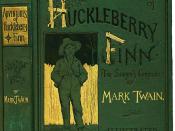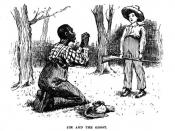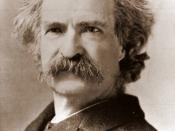In the book of Matthew, the Bible states that the second greatest commandment is to love your neighbor as yourself. When a person holds on to stereotypes and resentments towards his fellow man he cannot possibly love them to the degree called for. Both William Faulkner and Mark Twain show their characters struggling to progress past their stereotypes and the consequences of clinging on to them. In The Adventures of Huckleberry Finn by Mark Twain and Intruder in the Dust by William Faulkner the authors show that stereotypes often lead to the inability to see the situation as a whole as well as the internal conflict when these stereotypes are questioned.
The stereotypes that a person harbors can often result in the inability to see the 'big picture' in a situation. Twain showed this result through the duke and king when they are staying at the Wilk's house. The duke and king pose as the brothers of the deceased Harvey Wilk's in order to claim the fortune that he left behind.
Wilk's will tells them of a bag of gold in the cellar. When they find the bag, they offer it to the daughters of Harvey Wilk's; however, the daughters suggest that the money would be safer in the hands of the duke and king. The duke and king hide the money behind a curtain in their room, but then the duke thinks that they did not hide the money well enough. Huck observes them hiding the money and describes it. 'They took and shoved the bag through a rip in the straw tick that was under the feather bed, and crammed it a foot or two amongst the straw and said it was all right, now, because a n_____ only makes up the feather bed, and don't turn over...


